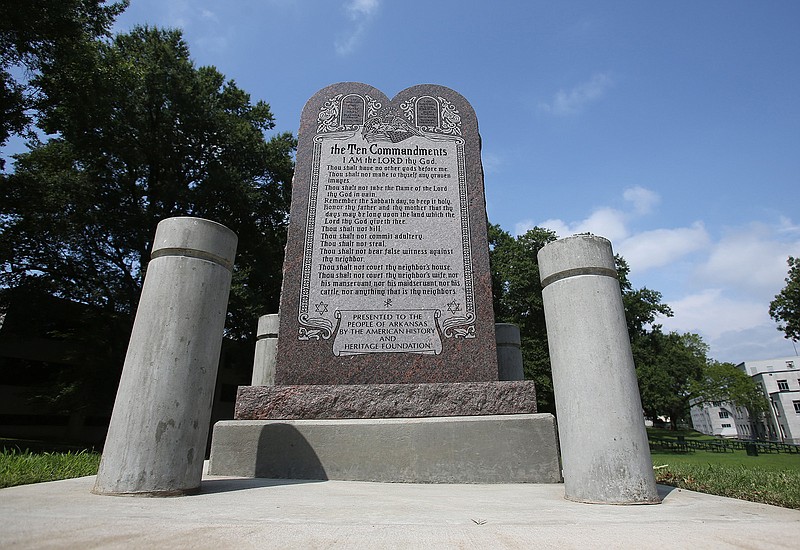Attorneys for The Satanic Temple, the Freedom From Religion Foundation and the Arkansas attorney general's office filed motions in federal court this week asking for summary judgment in a lawsuit over a Ten Commandments monument that was erected on the grounds of the state Capitol nearly five years ago.
Act 1231 of 2015, sponsored by then-Sen. Jason Rapert, R-Conway, and co-sponsored by then-Rep. Kim Hammer, R-Benton, says the General Assembly found that the Ten Commandments "are an important component of the moral foundation of the laws and legal system of the United States of America and of the state of Arkansas," and they "represent a philosophy of government held by many of the founders of this nation."
The Satanic Temple motion, filed along with a 35-page brief, maintains it was illegally denied placement of its own monument when the Legislature changed the rules after it appeared the temple's request for one was on the verge of authorization.
The lawsuit, Cave et al. v. John Thurston, was originally filed against then-Secretary of State Mark Martin on May 23, 2018. On June 25, 2018, it was merged with a similar lawsuit, Orsi et al. v. Martin, which was filed the same day. Both lawsuits contend that the monument violates the First Amendment by establishing governmental preference of one religion above all others.
The first Ten Commandments monument was installed at the Capitol on June 27, 2017, but was toppled within 24 hours by a man who rammed it with his vehicle and was later found mentally unfit to proceed to trial. A replacement monument, surrounded by 3-foot-tall concrete posts, was installed April 26, 2018.
The monument has been a lightning rod for controversy since passage of the state's Ten Commandments Monument Display Act in 2015.
It became even more of a lightning rod in 2017 with passage of Act 274, sponsored by Hammer and co-sponsored by Rapert, which changed the rules to require legislative approval for any monument before the proposal could be presented to the Capitol Arts and Grounds Committee. That legislation was introduced about a month after the committee's approval of The Satanic Temple's proposal to erect a statue of Baphomet -- a part-man, part-goat deity who is seated and accompanied by two smiling children -- alongside the Ten Commandments monument.
Hammer served in the House for eight years before being elected to the Senate in 2018. Rapert, who served as a senator from 2011 until 2023, was defeated by former Arkansas Attorney General Leslie Rutledge in 2022 in his bid for the state lieutenant governor's office. She replaced former Lt. Gov. Tim Griffin, who was elected attorney general in 2022.
Griffin said Tuesday that he stood behind his office's motion for summary judgment in favor of Thurston that said the change in the law streamlined the process by which organizations can have a monument erected.
That filing said that the "Vetting Efficiency Act," as the law is referred to, was passed in order that private sponsors could cross the most challenging hurdle -- legislative approval -- first, so that those sponsors and the Capitol Arts and Grounds Committee would not "waste resources on vetting potential monuments that lack support of the General Assembly."
However, the Satanic Temple, arguing that it is a minority religion recognized by the Internal Revenue Service through its designation as a tax-exempt 501(c)(3) public charity, said in its filing that two days after the Jan. 24, 2017, introduction of the bill that became Act 274, Rapert posted a video to his Facebook page calling the organizational belief structure of The Satanic Temple, "vile," "unnecessary" and "an affront to every American citizen."
"It will be a very cold, cold day in Hell," The Satanic Temple's filing quoted Rapert as saying, "before you'll ever see a statue from The Satanic Temple or some other group like that at the Arkansas Capitol. It is not going to happen. So, rest easy."
On Tuesday, Sam Grover, associate counsel for the Freedom From Religion Foundation, which represents the Orsi plaintiffs, said while the goal of The Satanic Temple is to have all religions represented on the Capitol grounds, his organization's aim is to have no religion represented, because such representation gives state approval to religion in defiance of the establishment clause of the U.S. Constitution.
"In this case, the establishment clause was designed to prohibit governmental preferences for any faith or religion," Grover said. "That's exactly what the Arkansas General Assembly did in this case. It created a monument that, by its own admission, is meant to commemorate the Ten Commandments, a quintessentially religious idol."
According to the Freedom From Religion Foundation's filing, the framers of the U.S. Constitution relied upon a number of sources "from which they drew inspiration while forming our Republic," including Roman law, European Continental law, British law and other legal systems but that the "Ten Commandments did not garner a mention." That filing also says there is no mention of the Ten Commandments or the Bible in the index of the Federalist Papers, authored by Andrew Hamilton, John Jay and James Madison, and that case law early in the country's history had "no significant reliance on the Ten Commandments."
"There's no case law in the 19th Century to indicate that judges or lawyers believed the Ten Commandments served as the basis for American law," Grover said. "In all of the Federalist Papers where they're discussing the meaning of the Constitution, they never bring it up. There's no reason to believe the Ten Commandments served as a basis for modern American law."
The lawsuit is being heard by U.S. District Judge Kristine G. Baker. As of Tuesday night, no hearings on the summary judgment motions had been scheduled.
